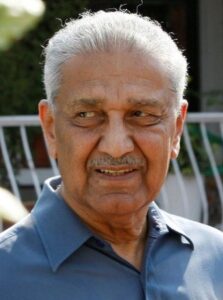 Abdul Qadeer Khan (photo, left), 85, died of Covid-19 on October 10, 2021. In this case, the virus did humanity a service.
Abdul Qadeer Khan (photo, left), 85, died of Covid-19 on October 10, 2021. In this case, the virus did humanity a service.
His passing was reported in the international press, but I didn’t notice at the time. That’s why I’m a couple months late with this story.
A Pashtun born in Bhopal, India in 1936, the son of a schoolteacher, he moved to Pakistan at age 16, where he graduated from Karachi University at age 20 with a degree in physics.
He then got a government job as an inspector of weights and measures, an inauspicious start for a young man who would become the world’s most notorious proliferator of nuclear weapons technology. Years later, CIA director George Tenet considered him more dangerous than Osama bin Laden.
Within a few years, he was studying in Europe, where he got a Ph.D. in metallurgical engineering. He then got a job with a Dutch firm involved in uranium enrichment to make fuel for nuclear power plants. From there it was short step, not a giant leap, for the wandering curiosity of this genius to land on atomic bombs.
The first step was to steal his employer’s uranium enrichment centrifuge technology. In time, he was supplying or acting as a conduit for know-how, equipment, and materials to practically every bomb-hungry Muslim regime on the planet. His clients included North Korea, Libya, Iran, and probably also Saddam Hussein’s Iraq, Bashir Assad’s Syria, and Algeria.
Fortunately, actually building a bomb isn’t easy, and of those countries, only Pakistan and North Korea have functional nuclear weapons today. (Although Iran probably is unstoppable at this point.)
That’s bad enough; most experts consider a nuclear war most likely to break out between India and Pakistan, not between the U.S. and Russia, China, or North Korea. Those two neighboring countries have already fought several conventional wars fueled by ethnic and religious hatreds, and territorial disputes that remain unresolved.
Plenty of countries consider it unfair for a few big countries to have nuclear weapons when they don’t, but fair has nothing to do with it. This is one technology the “haves” (China excepted) don’t want to share. (Some of their concerns are detailed in the final chapter of the book mentioned below.)
Israel bombed nuclear facilities in Iraq and Syria for its own self-preservation; then, when the U.S. invaded Iraq over supposed WMDs that didn’t exist, Libya’s Gaddafi voluntarily handed over all his nuclear facilities and materials figuring he was next. (G. W. Bush’s Iraq War, which cost $2 trillion and 4,400 American lives, at least was good for that.)
Basically the U.S. and Israel sent a message that little countries having nuclear weapons is too dangerous to allow even if it takes military action to prevent it.
(The U.S. put some pressure on Pakistan, but ultimately looked the other way at its nuclear weapons, because it needed that country’s cooperation to feed arms and support to the Afghans fighting off the Soviet invasion of their country.)
In Pakistan, A. Q. Khan is a national hero. That country wouldn’t have its A-bombs without him. Having them, they feel less vulnerable to being pushed around by India, and feel freer to send terrorists into India.
In the West, he’s a pariah. He wasn’t just working for his government; he was an arms merchant who sold the technology to rogue states for personal profit. Embarrassed by those activities, his government kept him under house arrest his later years. He was given a state funeral.
His career as the proprietor of an A-bomb bazaar is detailed in the 2010 book Nuclear Express, an authoritative history of nuclear weapons by two American designers of such weapons, which you can get from Amazon here.
Good riddance.